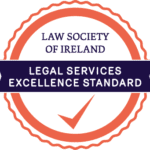BEFORE YOU DECIDE YOU WANT TO CHALLENGE A WILL – PLEASE READ THIS
Our office has developed a reputation for taking cases in relation to Will challenges concerning either members of the family or near relations who feel they have been disappointed as a result of being omitted from the Deceased’s Will.
We see a certain pattern emerging over the past number of years. This is that the grown up adult children may have left Ireland and be living and working abroad. The remaining sibling who is in Ireland in the latter years of the Deceased’s life seems to be involved in taking the Deceased to a Solicitor to ensure that the Will is made before their death.
The other children are very often surprised when, after their parent’s death, they see the person who has remained has become the sole beneficiary to the exclusion of the other members of the family. This may be in contrast to any statements made by the Deceased during their lifetime when these other children were in their presence.
A couple of facts to get straight from the outset.
- There is no automatic right for any child to inherit from their parent’s Estate. We get numerous calls from disappointed children indicating that this is in some way wrong and they should get some benefit automatically. The only benefit automatically guaranteed by the Succession Act 1965 provisions is for a spouse, known as a legal right share.
- To contest a Will is expensive and usually an uphill battle. The law presumes that the Will, if validly drawn up by a Solicitor and witnessed correctly, is in fact a valid Will. Anybody who wishes to challenge this must rely on either
- The person making the Will not being of sound disposing mind. That means they did not know what they were doing or
- They were under undue influence of the ultimate beneficiary to make the Will in that person’s favour.
- The role of medical evidence is important and even to locate the relevant details can be an uphill battle from the Deceased’s GP. Very often on the death of a patient GPs forward their records to the HSE for archiving and they in turn, unless requested by the Executor of the Will, will not release them without a Court Order under the new data protection regulations.
- Not all persons in the family are entitled to a copy of the Will if they are not beneficiaries. Some Solicitors simply ignore requests by members of the family to provide a copy of a Will where they are not included in it. This causes great upset to family members especially if the person who benefited is also the Executor. The Executor essentially controls the distribution of any documents relating to the Estate. Some Solicitors simply send a letter indicating that a benefit has been left to you and detailing whatever it is without enclosing a copy of the Will.
It is always best for family relations that a copy of the Will should be sent to all members but this is only a recommendation and is very much up to the particular Executor dealing with the Estate.
Contesting Wills, whether in the Circuit or High Court, is an expensive proposition.
A commercial reality must be taken to it. There are legal fees to be paid which very often involve the time taken to bring the matter to a full hearing. Counsel must be instructed with appropriate fees for their involvement who will guide what witnesses are necessary and run the case if it goes to a hearing.
There is no guarantee that the costs of the challenge, if unsuccessful, will be met out of the Estate. Traditionally there was a feeling that to challenge a Will the costs of the challenge, even if unsuccessful, were met out of the Estate itself. In recent years Judges have countered this by indicating that people who take actions with no basis of success should not benefit from their actions by having their costs paid by the Estate and very often they are left to pay these themselves.
The role of the Doctor is important. If there is no Doctor certifying that the person making the Will was of sound disposing mind and a Solicitor making the Will does not obtain such a letter then there may be cause for concern that the person was not of mind to decide their assets.
In summary careful consideration must be taken before any Will challenge can be mounted. You should refer to the above headings before deciding to call us to consider taking a case on your behalf.


